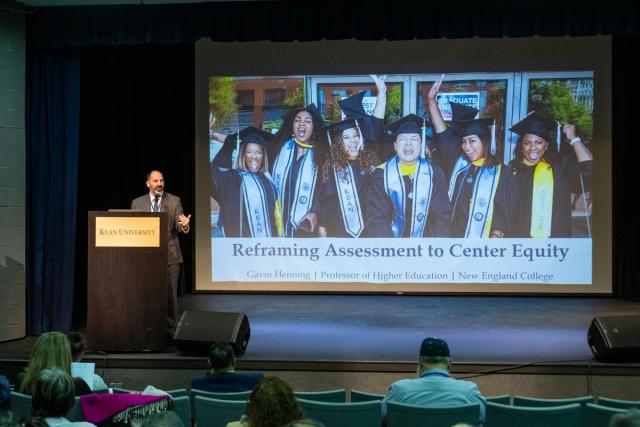Closing the Equity Gap Is Focus of Kean’s Inaugural Assessment Summit
An international expert on assessment and equity gaps in higher education told an audience of faculty and staff at Kean University’s first Assessment Summit to “use assessment as a vehicle for equity.”
Scholar and author Gavin Henning, Ph.D., who is a professor of higher education at New England College, was the keynote speaker at the summit, held October 19, in the Miron Student Center.
Calling assessment a “state of mind” that must be embedded into Kean’s everyday practices to help ensure equity for all students, he urged the audience to reconsider how they think about student academic performance and success.
“We want to move away from this idea of equity gaps and toward institutional performance gaps,” Henning said. “When we focus on student deficits, we have a tendency to unconsciously place the blame on students. If we make a commitment to enroll these students, we are committed to helping them succeed.”
The summit, with the theme Reframing Assessment to Center Equity, was organized to help develop best practices in assessment to address disparities in student success based on race and ethnicity, gender, socioeconomic status and other demographic traits. It aligned with Kean’s participation in the Moon Shot for Equity initiative, a national network of colleges and universities dedicated to eliminating equity gaps in higher education. The Office of Accreditation and Assessment (OAA), the Division of Strategic Analytics and Data Illumination (SADI), and the University Assessment Committee (UAC) co-sponsored the daylong event.

Senior Vice President for Administration Michael Salvatore, Ph.D., said the goal of the summit was “to understand how our University works – what processes, systems, pedagogy and outcomes work for some students but not others.
“There is a lot of work to do here. We have the right team to do it, and we are morally obligated to change something,” Salvatore said. “Our students are waiting for us to do something different, and now we have data and information to begin to make changes.”
Henning advised the audience to cultivate awareness about their own status and privilege, and how their position in life impacts every interaction with students.
“Awareness matters. We need to think about who we are, what power and privilege we bring,” he said. “Think of assessment as inquiry, not just documenting, because that will help us find the opportunities to address the gap.”
Henning noted there is a simple first step in developing an equity-centered assessment approach.
“Involve students. That is the easiest thing to do to be equity centered,” he said. “Students bring their culture to the institution, and that impacts how they learn. So we have to get to know our students.”
At a breakout session after his presentation, Henning answered questions and conducted exercises to help attendees develop action items for their departments and divisions to align assessment with equity. The breakout session was followed by workshops and seminars conducted by assessment leaders on Kean’s campus that explored Moon Shot for Equity best practices as well as the expansive data available through SADI to inform the assessment process.